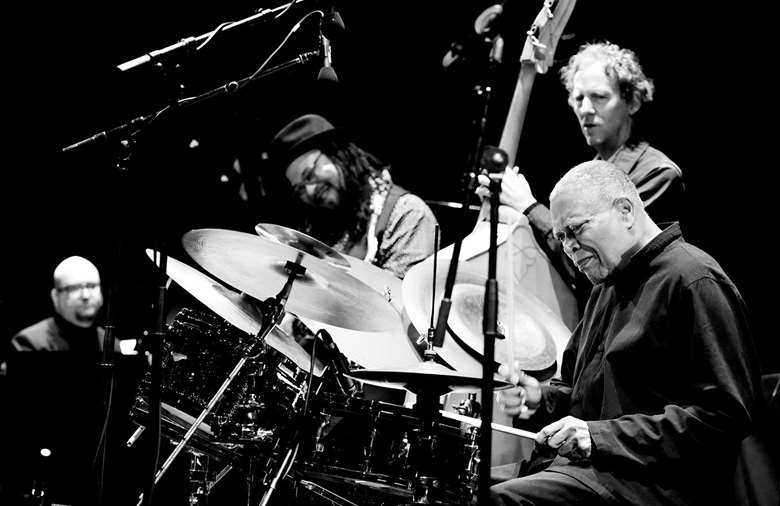Germany’s Long-Lived Moers Festival Shapes Abstraction Into Energised Expression
Martin Longley
Monday, July 3, 2023
Martin Longley bathes in improvisation, composition, electronics and rockaboogie…

Moers Festival has never called itself a jazz festival, but the first few decades from its 1972 creation were decidedly dominated by the spirit of free improvisation. Later on, a Whitsun Monday of African acts developed as a new tradition, and over the last 15 years or so, the drapes have swung open to avant rock, electronic and moderne composed musics. Just about any forms of extreme, challenging and plain ole weirdo sounds are now welcome in this small German town, nestled not far from Cologne.
Cynics dig calling Moers a ‘hippy’ festival. Your scribe heard such a word on several occasions, as he navigated the surrounding stalls that sell herbs, kaftans and joss sticks, or looking down on the camping site that lay between the fest’s two main stages of Halle (indoor hangar) and Rodelberg (outdoor grassiness). There are indeed quite a few folks still around from back in 1972, joyously entrenched in free jazz extremity. This is a positive factor. Perhaps their main hangout is the Annex courtyard stage, initiated last year, where spontaneous groupings of players gather for instantaneous creation. This year, the same stage became the venue for the festival’s long-running Moers Sessions, also a platform for improvisation. This tended to blur the identities of these entities. Meanwhile, on the bigger stages there was no shortage of composed jazz, with sets by Kenny Garrett, Billy Hart and Gary Bartz (the latter fronting Scatter The Atoms That Remain).
Although jazz and improvisation are both crucial to Moers, it so happened that several of this long weekender’s most thrilling performances came from acts outside of that zone, although this festival’s audience is totally tuned into its wide-ranging tastes. The Gavin Bryars Ensemble played an oddly late night set of greatest hits, including both sides from that absolutely classic 1975 debut on Brian Eno’s Obscure label. Pharmakon stunned with her solo show involving fierce vocals and densely sculpted tectonic-electronic plates, stalking the stage, troubling the crowd in trademark New Yorker fashion. The wild French-Italian garage rock duo of Putan Club took a similar approach, actually setting up on the floor of the Eventhalle. The expanded Belgian group Neptunian Maximalism closed the festival’s outdoor stage with their heavy-ritual proggoid riff-rock, after the likes of Magma and Hawkwind. Phew!
Altoman Garrett was surprisingly nowhere near as transcendent compared to last year’s Jazzkaar festival set in Tallinn. The Eventhalle acoustics didn’t agree with his band’s aesthetics, for some reason, and the good times sounded slightly forced. Hart, however, was the most impressive and vital member of his own quartet, in that same space, but with your scribe standing only a few feet from his drumkit.
Brandon Seabrook led his seated trio, which featured a pair of excellent elders, Cooper-Moore and Gerald Cleaver. Thus, the mix of banjo, guitar, drums and diddley-bow took over the realm of improvisation, the latter hand-crafted instrument being similar to a berimbau, or a one-stringed blues guitar. They leapt into the power surge of their short set, Seabrook to the razoring fore, while the other two stoked fiercely, Cooper-Moore using a pair of sticks to heavy bass effect.
Here was a rare sighting of keyboardist Vyacheslav Ganelin, on the run from Russia for decades (Israel, Lithuania), leading his Priority trio. He combines acoustic piano with retro electric keys, something he’s been into since that revelatory tour of the UK in 1984. Ganelin is joined by soprano saxophone and gong-heavy drums, initially calm, adopting a filmic style. He also has his own mini-percussion kit to the side of the piano, just like in the old days. A compulsively house-y pulse springs up, Ganelin free-forming over this reliable base.
Günter ‘Baby’ Sommer led a big band dedicated to the music of Chris McGregor’s Brotherhood Of Breath, uniting a line-up that was drawn from several scenes, including Raymond MacDonald, Gebhard Ullmann, Frank Gratkowski (reeds) and Lina Allemano (trumpet). Their set was a pure celebration of rousing themes filled with extreme free outbreaks, Sommer himself leading with outstanding gusto, shouting out encouragement and laying down a sensitive swing minimalism. Natural brass pomp flurries benefited from crystal sound-mixing, which also gave the leader a full thwack on his skins.

Bart Maris & Jean-Hervé Peron - photo by Lars Schmidt
Just before (and during) the Neptunians festival climax, the Annex also peaked with its greatest set, led by chief organiser Jean-Hervé Peron, member of the veteran experimentalists Faust. His excellently sculpted roster also included ex-Henry Cow sticksman Chris Cutler and Stateside bassist Damon Smith, who had already shone very darkly during several of the weekend’s sets. The Belgian trumpeter Bart Maris was also on hand, to bolster Peron’s own horn, and local guitarist Raissa Mehner shone, proving herself as a powerful new discovery during the festival. She will grow quickly, already possessing an extremely resourceful sound, not so much descended from jazz, but from rock-noise. Together they made a mass drone cumulus, igniting into an anthemic growth, Peron orating manically while churning his cement mixer, spewing stone-powder outwards, heading for a ranting biker-riff outro.
Smith’s earlier set with lap-guitarist Sandy Ewen and alto/sopranino saxophonist Stefan Keune illustrated the severe sensitivity of their relationship, paying magical attention to the silences as well as the louder grinds: spiked details on a sparse stage, string tensions and glancing bows, bent and brittle. The trio opted for a selection of shorter pieces, all the better to clear their, and our, palates. On the outdoor Rodelberg stage, it was astounding to witness the sheer attentive quietness of the spread-out crowd, immersed in this extreme sonic realm. It was exciting and jarring to share this vibration amidst a large-scale parkland scenario, and a genuinely off-kilter experience, the intimate spreading its wings into nature, outside of a typical attic or basement improvisation den.